Police scramble to prepare for Euro 2008
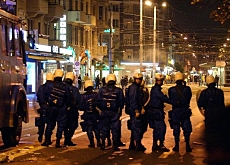
Exactly three years before the European football championships kick off in Switzerland and Austria, police are racing against the clock to get ready.
Security specialists are hoping new legislation on hooliganism, and specific preventive measures will be in place before the huge event.
For the Swiss, hosting major events is not a problem. According to Martin Jäggi, head of security for the tournament, police are regularly deployed at the World Economic Forum meeting in Davos and at international football matches.
He sees the real problem as being the sheer scale of Euro 2008.
“It’s a succession of important matches,” he told swissinfo. “This is the third-biggest sports competition in the world and that’s the challenge we face.”
Last year’s European championships in Portugal attracted more than a million spectators, with around 38,000 attending each game.
Hooligan elements
The biggest security fear is the presence of hooligans, more intent on looking for a fight than watching the match.
Switzerland has problems with militant fans in its own stadiums. Just recently supporters from Basel and Grasshoppers Zurich faced off after games between the two clubs.
But Jäggi says that it is perhaps better for the unruly fans to get it out of their system now.
“I’m not unhappy it has happened now rather than later,” he added. “We are analysing the situation and will take appropriate measures.”
Those measures include meeting fans and carrying out preventive work before 2008, according to the commander of Solothurn’s cantonal police.
Domestic hooligans might be the least of the police’s concerns. The arrival of large numbers of foreign visitors for the games means that, according to some specialists, thousands of hooligans following national teams could also make their way to Switzerland.
Legislation
The Swiss have been analysing security measures taken in Portugal for Euro 2004, as well as those in preparation for next year’s World Cup in Germany. Jäggi says the Swiss and Austrians will develop a common security plan.
But he admits any plan needs a legal grounding, and so far parliament has failed to approve legislation that cracks down on hooligan behaviour. It is not expected to pass a new law on domestic security before next year.
Jäggi is confident that despite the delay, police will have time to prepare for Euro 2008, even if some security specialists fear it will be too late.
“Once the legislation is in place, we will set up a hooligan database,” he told swissinfo. “The law will be a useful tool against militant fans.”
Besides logging personal information about Swiss hooligans, the database should also include details of known troublemakers from other countries.
The head of security reckons it shouldn’t be too difficult to compile since the police already share data with their foreign counterparts ahead of international matches.
Special measures
Jäggi hopes that special measures outlined in the proposed legislation will be approved.
“We plan to take known hooligans into preventive custody,” he said. “Our main concern is whether we will have enough space to hold these people if necessary.”
He doesn’t think that specially built prisons are on the cards, preferring to talk of “holding areas” aimed at keeping troublemakers out of mischief. As to whether courts will be set up to sentence hooligans quickly, he adds the jury is still out.
And he warns that nobody should expect the police to decide alone on banning access to stadiums.
“That’s a decision that has to be taken by stadium owners,” he said. “If we want to improve security, we will have to work closely with them.”
The European football championships will run from June 7 to June 29, 2008.
swissinfo, Scott Capper
Austria and Switzerland were chosen in 2002 by Uefa to jointly organise the European football championship in 2008.
Four stadiums in each country should host matches – Basel, Bern, Geneva and Zurich in Switzerland, and Innsbruck, Klagenfurt, Salzburg and Vienna in Austria.
In Switzerland, the tournament is expected to generate business worth at least SFr470 million ($376 million).

In compliance with the JTI standards
More: SWI swissinfo.ch certified by the Journalism Trust Initiative
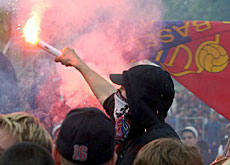
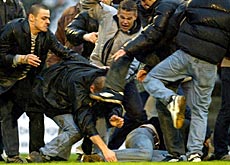
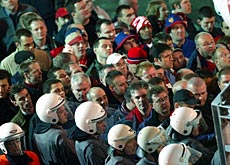
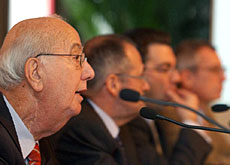
You can find an overview of ongoing debates with our journalists here. Please join us!
If you want to start a conversation about a topic raised in this article or want to report factual errors, email us at english@swissinfo.ch.